Amazon Web Services (AWS) is the world’s leading cloud computing platform, offering a wide range of services to power businesses of all sizes.
Learning AWS unlocks a world of opportunities, from building scalable web applications and deploying serverless functions to managing databases and analyzing data.
It’s a valuable skillset for anyone looking to advance their career in technology.
Finding the right AWS course on Udemy can be a challenge.
You want something comprehensive, engaging, and taught by experts, but also tailored to your specific learning style and goals.
You might be looking for a course that covers everything you need for the AWS Certified Solutions Architect Associate exam, or you might be interested in a more beginner-friendly course that introduces you to the basics of cloud computing.
We’ve reviewed countless AWS courses on Udemy and based on our analysis, "Ultimate AWS Certified Solutions Architect Associate SAA-C03" is the best course overall.
It is taught by a highly-rated instructor with extensive AWS experience and provides a comprehensive overview of AWS concepts, tools, and services.
The course includes hands-on labs, real-world examples, and practice exams to help you prepare for the SAA-C03 exam.
While this is our top pick, there are other great options available.
Whether you’re a beginner or an experienced developer, we’ve got you covered.
Keep reading for our full list of recommendations and find the perfect AWS course to help you reach your career goals.
Ultimate AWS Certified Solutions Architect Associate SAA-C03
The course starts with an introduction to AWS, guiding you through creating an account, navigating the console, and understanding core services like IAM, EC2, and VPC.
You’ll learn hands-on how to manage users, groups, policies, and roles in IAM, as well as how to use the AWS CLI and SDK.
Next, you’ll dive deep into EC2, exploring instance types, security groups, purchasing options like Spot Instances, and storage solutions like EBS, EFS, and AMIs.
The course also covers critical concepts like high availability and scalability with Elastic Load Balancing and Auto Scaling Groups.
Moving on, you’ll learn about AWS databases like RDS, Aurora, DynamoDB, and ElastiCache, as well as networking services like Route 53 for DNS management.
The syllabus covers decoupling applications with SQS, SNS, and Kinesis, containerization with ECS, Fargate, and EKS, and serverless architectures with Lambda, API Gateway, and Step Functions.
It covers advanced S3 features like lifecycle policies, event notifications, and security aspects like encryption and access control.
You’ll also learn about CloudFront for content delivery, AWS Global Accelerator, and storage extras like Snowball, FSx, and Storage Gateway.
Additionally, the syllabus covers data analytics services like Athena, Redshift, and OpenSearch (formerly ElasticSearch), as well as machine learning services like Rekognition, Transcribe, and SageMaker.
Monitoring and auditing with CloudWatch, CloudTrail, and AWS Config are also covered in-depth.
The course prepares you for real-world scenarios with solution architecture discussions, disaster recovery strategies, and migration services like DMS and MGN.
You’ll also explore other services like CloudFormation, SES, Pinpoint, and AWS Batch.
Finally, the course provides exam preparation resources, including practice exams, exam tips, and links to whitepapers.
[NEW] Ultimate AWS Certified Cloud Practitioner CLF-C02
This comprehensive syllabus covers everything you need to ace the AWS Certified Cloud Practitioner certification exam.
The course starts by introducing you to the fundamentals of cloud computing, including its different types and the AWS Cloud overview.
You’ll get hands-on experience with the AWS console and services, ensuring you’re comfortable navigating the platform from the get-go.
One of the course’s highlights is the in-depth coverage of Identity and Access Management (IAM).
You’ll learn how to create users, groups, and policies, enabling you to manage access to AWS resources securely.
Additionally, you’ll explore multi-factor authentication (MFA), access keys, and the AWS Command Line Interface (CLI).
Moving on, you’ll dive into Elastic Compute Cloud (EC2), Amazon’s virtual server offering.
From launching instances to configuring security groups and SSH access, you’ll gain practical experience in managing compute resources.
The course also covers EC2 instance storage options, including Elastic Block Store (EBS), snapshots, and Amazon Machine Images (AMIs).
Load balancing and auto-scaling are essential concepts for building scalable and highly available applications in the cloud.
This course covers Elastic Load Balancing (ELB) and Auto Scaling Groups (ASG), equipping you with the skills to distribute traffic and automatically scale resources based on demand.
Storage is a critical aspect of any cloud infrastructure, and the course dedicates a comprehensive section to Amazon Simple Storage Service (S3).
You’ll learn about S3 buckets, security, versioning, replication, and storage classes, ensuring you can effectively manage and secure your data in the cloud.
Databases and analytics are covered in-depth, with lectures on Amazon Relational Database Service (RDS), Aurora, DynamoDB, Redshift, and Athena.
You’ll gain insights into choosing the right database solution for your needs and learn how to work with these services hands-on.
The course also explores other compute services like Elastic Container Service (ECS), Fargate, and AWS Lambda, introducing you to containerization and serverless computing concepts.
Deployment and infrastructure management are crucial aspects of cloud operations.
You’ll learn about CloudFormation for infrastructure as code, Elastic Beanstalk for application deployment, and various AWS developer tools like CodeCommit, CodeBuild, and CodePipeline.
Leveraging the AWS global infrastructure is essential for building highly available and low-latency applications.
The course covers Route 53 for DNS management, CloudFront for content delivery, and services like AWS Outposts and WaveLength for extending AWS infrastructure to on-premises and edge locations.
Cloud monitoring is another critical topic covered in the course.
You’ll learn about CloudWatch for metrics, logs, and alarms, as well as services like AWS Health Dashboard and X-Ray for monitoring and troubleshooting.
The course also covers networking concepts like Virtual Private Clouds (VPCs), subnets, security groups, and network access control lists (NACLs), ensuring you understand how to securely connect your resources in the AWS Cloud.
Security and compliance are paramount in the cloud, and the course dedicates a section to these topics.
You’ll learn about the shared responsibility model, DDoS protection with AWS WAF and Shield, encryption with AWS Key Management Service (KMS), and various security services like GuardDuty, Inspector, and Config.
Machine learning is an increasingly important aspect of modern applications, and the course introduces you to AWS services like Rekognition, Transcribe, Polly, and SageMaker.
Finally, the course covers account management, billing, and support topics, including AWS Organizations, Control Tower, pricing models, cost optimization tools, and support plans.
With hands-on labs, quizzes, and a practice exam, this course ensures you’re well-prepared for the AWS Certified Cloud Practitioner certification.
Ultimate AWS Certified Developer Associate 2024 NEW DVA-C02
This comprehensive course covers everything you need to know to prepare for the AWS Certified Developer Associate exam.
It starts with the fundamentals, guiding you through setting up your AWS account, the AWS console, and core services like IAM, EC2, EBS, EFS, and more.
You’ll dive deep into critical developer services like S3 for storage, CloudFront for content delivery, Route 53 for DNS management, API Gateway for building APIs, Lambda for serverless computing, and DynamoDB for NoSQL databases.
The course provides hands-on labs for each service, ensuring you gain practical experience.
One standout section focuses on CI/CD and infrastructure as code with services like CodeCommit, CodePipeline, CodeBuild, CodeDeploy, and CloudFormation.
You’ll learn how to set up automated deployment pipelines and manage infrastructure using YAML templates.
The course also covers monitoring with CloudWatch, logging with X-Ray, auditing with CloudTrail, serverless application development using SAM and CDK frameworks, containerization with ECS, ECR and EKS, messaging with SQS and SNS, streaming with Kinesis, and much more.
What makes this course truly invaluable is the depth of coverage on critical developer topics like serverless patterns, authentication and authorization with Cognito, data encryption with KMS, infrastructure security, and advanced identity management with STS and IAM.
You’ll learn best practices for building secure, scalable, and highly available applications on AWS.
The instructor provides clear explanations, demos, and hands-on activities, making complex concepts easy to understand.
The course also includes practice tests to gauge your exam readiness and tips for scheduling and taking the certification exam.
AWS Certified Cloud Practitioner (CLF-C02) Exam Training
The course starts by introducing you to cloud computing concepts and the benefits of using AWS.
You’ll learn about the global infrastructure, shared responsibility model, and how to launch cloud services.
This lays a solid foundation for understanding AWS.
Next, it dives into essential AWS services like Identity and Access Management (IAM), covering users, groups, roles, policies, and multi-factor authentication (MFA).
You’ll get hands-on experience setting up MFA and configuring password policies.
The course then explores AWS compute services like EC2 instances (Windows and Linux), launching containers on ECS, and using AWS Batch for batch computing workloads.
You’ll learn about storage services like EBS, EFS, S3 storage classes, versioning, replication, and static website hosting.
It covers key networking concepts like VPCs, security groups, NACLs, NAT gateways, VPN, and Direct Connect.
You’ll create a custom VPC and configure network components.
The course also covers DNS with Route 53 and registering domains.
For application development, you’ll learn about serverless with AWS Lambda, API Gateway, Step Functions, and building event-driven applications.
The deployment section covers CloudFormation, Elastic Beanstalk, CDK, and developer tools.
Database services like RDS, DynamoDB, Aurora, RedShift, and analytics with Athena and EMR are covered in-depth.
You’ll create databases and explore data analytics capabilities.
It covers governance with AWS Organizations, compliance using AWS Config, cost management tools like Cost Explorer, and migration services.
Security is a crucial aspect, and you’ll learn about encryption, CloudTrail for logging, firewalls, DDoS protection, and penetration testing.
The course also introduces machine learning services and IoT.
Finally, it prepares you for the exam with tips, a full-length practice exam, and a bonus lesson.
AWS Essentials
The syllabus covers a wide range of topics, starting with an introduction to cloud computing and the benefits it offers.
You’ll dive into the AWS platform, exploring its global infrastructure, including regions, availability zones, and the content delivery network.
The course then delves into the foundational services of AWS, such as Amazon Elastic Compute Cloud (EC2) for computing power, Amazon Simple Storage Service (S3) for storage, and Amazon Virtual Private Cloud (VPC) for networking.
One of the key aspects covered is security and Identity and Access Management (IAM).
You’ll learn about the shared security model, physical security measures, and how to configure security groups and IAM policies to control access to your resources.
The course also covers database services like Amazon Relational Database Service (RDS) and Amazon DynamoDB, helping you understand their differences and use cases.
Elasticity and management tools are essential for scaling and monitoring your AWS environment.
The syllabus covers Auto Scaling for automatically adjusting compute capacity, Elastic Load Balancing for distributing traffic across instances, and Amazon CloudWatch for monitoring resources and applications.
Throughout the course, you’ll have opportunities to reinforce your learning with knowledge checks and hands-on demonstrations.
These practical exercises will guide you through tasks like building a VPC, launching a web server, creating a database server, and scaling and load-balancing a web application.
AWS Certified Solutions Architect Associate Practice Exams
This course offers six comprehensive practice tests that simulate the actual AWS certification exam.
Each practice test consists of 65 multiple-choice and multiple-answer questions, designed to be completed within 130 minutes.
To pass, you’ll need to score at least 75%, which is the same passing score as the real exam.
After completing each test, you can review the questions, detailed explanations, reference links, and AWS cheat sheets by clicking the “Review questions” button.
One convenient feature is the ability to jump straight to the answer key and explanations.
Simply click the “stop” button at the start of the test, then the “Review questions” button on the results page.
This can be handy if you want to quickly review the material without taking the full practice test.
The practice tests cover a wide range of topics related to the AWS Solutions Architect Associate certification, including designing highly available, cost-efficient, fault-tolerant, and scalable distributed systems on AWS.
By taking these practice exams, you’ll gain valuable experience with the types of questions and scenarios you’ll encounter on the real certification exam.
If you have any questions or issues during the course, you can post them in the QA section for assistance.
With its realistic exam simulations and comprehensive review materials, this course can help you feel confident and prepared for the AWS Certified Solutions Architect Associate exam.
6 Practice Exams | AWS Certified Cloud Practitioner CLF-C02
This course provides six full-length practice tests, each consisting of 65 questions with a duration of 90 minutes and a passing score of 700.
One of the standout features of these practice tests is the randomization of question and response orders.
This ensures that each attempt feels fresh and helps you better prepare for the actual certification exam.
Additionally, you can only review the answers after completing the entire test, mimicking the real exam experience.
The course offers a convenient way to identify and address any areas of weakness.
If you encounter an issue with a question, you can ask for clarification in the Q&A section and provide a screenshot of the problematic question.
The instructors will promptly address your concerns and fix any issues, ensuring a smooth learning experience.
Each practice test is designed to thoroughly assess your understanding of the AWS Cloud Practitioner domains.
You’ll encounter questions covering a wide range of topics, from cloud concepts and security to technology and billing.
By attempting these practice tests, you’ll gain valuable experience with the exam format and question types, boosting your confidence for the actual certification.
While the course focuses solely on practice tests, it serves as an excellent complement to other AWS training resources.
You can use these tests to reinforce your knowledge, identify gaps, and fine-tune your preparation strategy before taking the certification exam.
AWS Certified Cloud Practitioner Practice Exams 2024
The course consists of six full-length practice exams, each containing a unique set of questions drawn from AWS’s extensive question bank.
While the actual exam questions may differ, the course creators assure that these practice tests cover all the topics you’ll encounter on the real certification exam.
One of the standout features is the detailed explanations provided for every question, regardless of whether your answer was correct or incorrect.
By carefully reviewing these explanations, you can deepen your understanding of the concepts and identify areas that need further study.
The course strongly recommends repeating the practice tests until you consistently score 90% or higher, which should give you the confidence to ace the actual certification exam.
The practice exams are designed to be challenging, mimicking the real exam experience.
The questions are shuffled randomly each time you retake a test, ensuring you don’t simply memorize the answers but truly grasp the underlying principles.
To further support your learning journey, the course provides access to a forum where you can post any questions you may have.
This valuable resource allows you to seek clarification, share insights, and learn from the experiences of other learners.
Introduction to Cloud Computing on AWS for Beginners [2024]
This comprehensive syllabus covers everything from the fundamentals to hands-on practice with AWS services.
You’ll begin by creating a free tier AWS account and learning essential IT concepts like client-server computing, storage types, networking, and virtualization.
This lays the groundwork for understanding cloud computing principles, service models, and deployment models.
Once you grasp the basics, you’ll dive into AWS’s core services.
Explore Identity and Access Management (IAM), Virtual Private Clouds (VPCs), security groups, and the AWS Command Line Interface (CLI).
Then, provision and manage Amazon EC2 instances, Auto Scaling groups, and load balancers to build scalable applications.
Storage is crucial, so you’ll learn to work with Elastic Block Store (EBS), Elastic File System (EFS), and the highly scalable Amazon S3 object storage service.
You’ll even create an S3 static website!
Databases are covered too - create an Amazon RDS database and read replica, plus try out the NoSQL DynamoDB service.
Automate deployments with AWS CloudFormation and Elastic Beanstalk while implementing CI/CD pipelines.
Optimize performance using Amazon Route 53 DNS and CloudFront content delivery.
Explore serverless with AWS Lambda functions and containers on Amazon ECS with Fargate.
Integrate services via EventBridge and API Gateway.
By the end, you’ll be ready to pursue AWS certifications like the Cloud Practitioner or Solutions Architect Associate exams.
AWS Certified Cloud Practitioner 2024 [NEW]
This comprehensive syllabus covers everything you need to know about Amazon Web Services (AWS) and cloud computing fundamentals.
The course starts by introducing you to cloud computing concepts, models, and characteristics.
You’ll learn about the revolution in the cloud computing industry and how AWS has been at the forefront of this transformation.
Next, you’ll dive into the core AWS services, including setting up your AWS account, key-based authentication, and launching your first EC2 instance.
You’ll explore connectivity options, firewalls, budgets, multi-factor authentication, and virtual private clouds (VPCs).
The syllabus also covers load balancing, auto-scaling, CloudWatch monitoring, and infrastructure as code with CloudFormation.
Machine learning is a crucial aspect of modern technology, and this course covers AWS services like Amazon Comprehend, Translate, Textract, Lex, Transcribe, Kendra, Rekognition, and Polly.
You’ll learn how to leverage these services for various use cases.
The networking services section covers DNS, packet capture with Wireshark, Route53, content delivery networks (CDNs) like CloudFront, and edge locations.
You’ll also learn about AWS Workspaces, disaster recovery techniques, Direct Connect, virtual private networks (VPNs), and networking components like transit gateways and local zones.
Storage is a critical component of any cloud infrastructure, and the syllabus covers Elastic Block Store (EBS), S3 storage classes, static website hosting, lifecycle policies, versioning, transfer acceleration, and storage class analysis.
You’ll also explore services like SQS, Storage Gateway, CloudWatch Logs, Elastic File System (EFS), Kinesis, Snowball, and Backup.
Databases are essential for most applications, and the course covers relational databases (RDS), NoSQL databases (DynamoDB), Amazon Aurora, database migration services, and caching with ElastiCache.
For developers, the syllabus covers tools like CodeCommit, CodeBuild, CodeDeploy, CodePipeline, CodeStar, Service Catalog, AppStream, Lightsail, SES, EventBridge, OpenSearch, Step Functions, Application Discovery Service, Transfer Family, API Gateway, and Athena.
Container services are becoming increasingly popular, and you’ll learn about Docker containers, container orchestration, Elastic Container Registry (ECR), and AWS Fargate.
The course also covers billing, support services, pricing models, the AWS Well-Architected Framework, AWS Health, AWS Marketplace, AWS Organizations, consolidated billing, Cost Explorer, business intelligence, X-Ray, and License Manager.
Security is a top priority in the cloud, and the syllabus covers the shared responsibility model, principle of least privilege, Identity and Access Management (IAM), AWS CLI, compliance, AWS Artifact, AWS Config, Trusted Advisor, CloudTrail, AWS Shield, Amazon Machine Images (AMIs), Amazon Macie, Amazon Inspector, VPC Flow Logs, AWS Systems Manager, cryptography, AWS CloudHSM, AWS Key Management Service, Amazon Cognito, Amazon GuardDuty, Amazon Detective, AWS Security Hub, AWS Secrets Manager, AWS Certificate Manager, EC2 Image Builder, IAM Identity Center (Single Sign-On), Firewall Manager, Network Firewall, Resource Access Manager, AWS Control Tower, and AWS Outposts.
Finally, the course includes exam preparation sections with important pointers and practice tests to help you ace the AWS Certified Cloud Practitioner certification exam.
Also check our posts on:
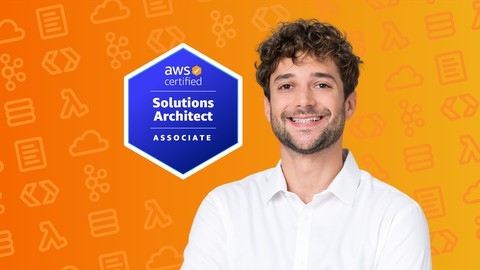

![[NEW] Ultimate AWS Certified Cloud Practitioner CLF-C02](/img/best-aws-courses-udemy/3142166_NEWUltimateAWSCertifiedCloudPractitionerCLF-C02.jpg)
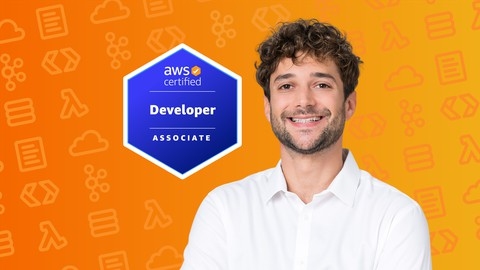
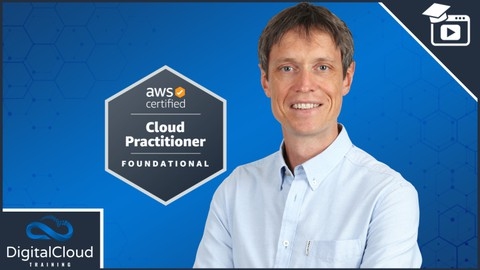
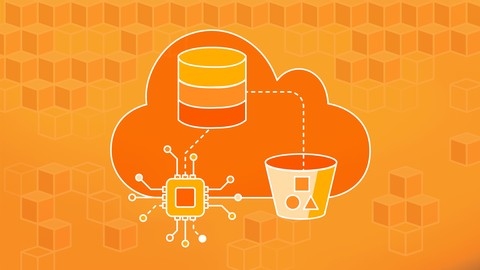
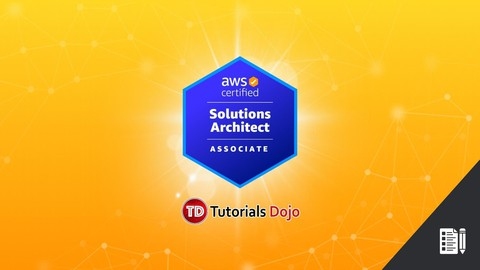
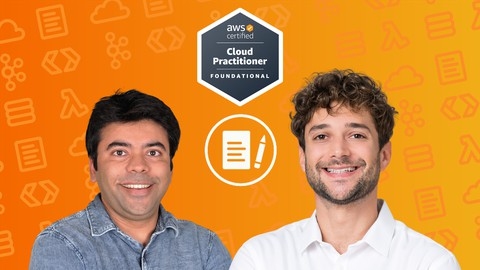
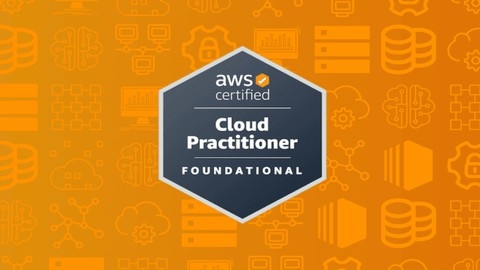
![Introduction to Cloud Computing on AWS for Beginners [2024]](/img/best-aws-courses-udemy/3329962_IntroductiontoCloudComputingonAWSforBeginners2024.jpg)
![AWS Certified Cloud Practitioner 2024 [NEW]](/img/best-aws-courses-udemy/1360446_AWSCertifiedCloudPractitioner2024NEW.jpg)